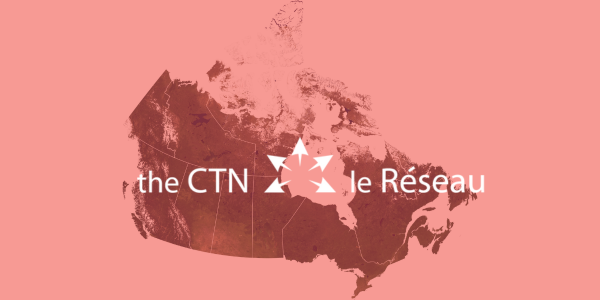CAHR 2022 will take place virtually from Wednesday, April 27 to Friday, April 29, 2022. The event features plenary sessions, special sessions on a wide variety of topics, oral abstracts and poster viewings, and opportunities to converse and network with colleagues and friends.
This year’s theme is Striving Towards Equity and Flourishing in the HIV Response.
Below, we summarize the sessions that CTN members are involved in.
Core agenda
Monday, April 25
5:00 AM–11:00 PM
On Demand Session: Successes and Challenges in COVID-19 Outpatient Management in PLWH: A Practical Perspective (sponsored by Merck)
Dr. Cécile Tremblay will provide healthcare providers with an up-to-date overview of the clinical management of SARS-CoV-2 infected patients with COVID-19 symptoms including diagnostic considerations and antiviral treatment options in the outpatient setting. Considerations include patient characteristics, risk factors for hospitalization and comorbidities.
Wednesday, April 27
12:00–1:00 PM
Dr Mark Wainberg Lecture — Women and HIV Research: A Call for Allyship
Dr. Mona Loutfy will detail this history and the many successes in the field of Women and HIV in Canada. Canadian HIV epidemiology regarding women will be reviewed. Findings from CTN 262: the Canadian HIV Women’s Sexual and Reproductive Health Cohort Study (CHIWOS), of which Dr. Loutfy is co-principal investigator, will be presented.
1:15–2:00 PM
Symposium: A UNITED Approach for Impactful HIV Care (sponsored by Gilead)
Muluba Habanyama will moderate a panel of health care professionals and community advocates, including Dr. Bertrand Lebouche, who will be discussing various perspectives on components of long-term treatment success.
4:45–5:45 PM
Using Administrative Data to Support the HIV Care Cascade in Key Populations
Drs. Robert Hogg and Anita Benoit will moderate this session that will include presentations on the challenges and opportunities in routinely collecting and using data on access to HIV care and the care cascade in key populations. Panelists include Drs. Siddharth Kogilwaimath and Abigail Kroch.
4:45–6:45 PM
CIHR Canadian HIV Trials Network Postdoctoral Fellowship Awards
Friday, April 29
11:00 AM–12:00 PM
Epidemiology & Public Health Keynote — Inventing the Future in the Present: Black Canadians, HIV and the Epidemiology of Structural Violence
Dr. Winston Husbands will discuss the epidemiological evidence for two epidemics, argue for research and policy directions that elevate Black health and wellbeing, and outline the significance of insurgent, collaborative Black stewardship of research and policy for Black communities.
12:00–12:45 PM
Symposium: Real World Experience with the latest ARVs – Reassurances and Concerns (sponsored by Merck)
Dr. Alex Wong will moderate a discussion on how the newer ARVs suit different patients and how outcomes may be better with one over the other, featuring Drs. Mona Loutfy and Benoit Trottier.
5:45–7:00 PM
Can we Optimize ART for Best Maternal and Child Outcomes
Dr. Lena Serghides will moderate this session, which aims to provide an overview on the safety and efficacy of HIV treatment in pregnancy, including considerations around breastfeeding and impacts of in utero exposure to HIV and ART on children. Dr. Serghides will present on evaluating associations between in utero HIV/ART exposure and pubertal status in children who are HIV-exposed but uninfected. Dr. Sarah Khan will also be involved in this session, presenting on developing consensus guidelines on infant feeding for women living with HIV.
Click here for the full conference agenda.
Abstracts
Monday, April 25
Poster Abstracts – Basic Sciences
GDF15 influences risk of non-AIDS comorbidities and HIV reservoir size independently of inflammation in ART-treated PLWH
Stéphane Isnard
Poster Abstracts – Clinical Sciences
Bictegravir/emtricitabine/tenofovir alafenamide (B/F/TAF) five-year outcomes in treatment-naïve adults
Jonathan Angel
The Quebec Commercial Infant Formula Program for families affected by HIV [Le Programme provincial de préparation commerciale pour nourrissons (P3CN) des Centres d’infectiologie mère-enfant du Québec (CIME_Q)]
Isabelle Boucoiran
Ongoing impact of the social determinants of health during the second and third waves of the COVID-19 pandemic in people living with HIV followed at a Montreal tertiary Care Centre
Cecilia Costiniuk
Physical and Sexual Abuse Among Gay and Other Men Who Have Sex with Men. HIV Risk Factors We Fail to Speak of
Paul MacPherson
Body Composition Changes Across a Three-Phased Community-Based Exercise Intervention Study Among Adults Living with HIV
Kelly O’Brien
Assessing the Sensibility, Utility and Implementation of a Short-Form Version of the HIV Disability Questionnaire in Clinical Practice Settings in Canada, Ireland and the United States: A Mixed Methods Study
Kelly O’Brien
Using a Personalized Measure to Identify Physical Health Challenges among People Living with HIV
Adria Quigley
Kaposi sarcoma in ART-treated PLWH and HIV-uninfected people: differences in viral and immune characteristics
Léna Royston
Transforming HIV Care: The Virtual Community Care Clinic (VC3) Model for On-Reserve Communities
Cara Spence
Bone Health of Aging HIV Infected Women
Sharon Walmsley
Evaluating Healthy Aging Among Canadian HIV-positive Older Adults in the CHANGE-HIV Cohort
Alice Zhabokritsky
Safety of Estrogen Ring and/or Probiotics for Improving Vaginal Health in African/Caribbean/Black Women: Results from a Prospective, Randomized, Open-label, Intervention Phase I Trial (CTN 308)
Christina Hayes
Feasibility of Estrogen Ring and/or Probiotics for Improving Vaginal Health in African/Caribbean/Black Women: Results from a Prospective, Randomized, Open-label, Phase I Trial (CTN 308)
Jenna Ratcliffe
Doxycycline as an Intervention for Bacterial Sexually transmitted infection ChemOprophylaxis (DISCO) study: Design of a national, multicentre randomized-controlled trial
Saira Mohammed
Poster Abstracts – Epidemiology & Public Health Sciences
CTN 328: Immunogenicity outcomes in people living with HIV in Canada following vaccination for COVID-19 (HIV-COV): Protocol for an observational cohort study
Cecilia Costiniuk
Impacts of COVID-19 restrictions on access to HIV and other healthcare services among women living with HIV and HIV-negative women participating in the BC CARMA-CHIWOS Collaboration (BCC3) Study: Preliminary Data
Angela Kaida
Mail-Home Dried Blood Spot Self-Collection for HIV, Hepatitis C, and Syphilis Screening: A Pilot Study Among Gay, Bisexual, Trans, Two-Spirit, and Queer Men and Non-Binary People (GBT2Q) in British Columbia
Nathan Lachowsky
The cascade of care for hepatitis C virus among gay, bisexual and other men who have sex with men in Vancouver, Toronto and Montreal
David M. Moore
Enhancing access to services for gbMSM: A decision-making guide to self-assess access to health services for gbMSM, based on a Community-Based Participatory Research
Joanne Otis
Contextual Factors Impact the Risk of HIV Infection in South African Townships: A Bayesian Analysis of Secondary Trial Data
Nitika Pant Pai
The Care Continuum Across HIV Clinics in Saskatoon, SK: Insights, Impacts, and Opportunities of the COVID-19 Pandemic
Cara Spence
Experience with the Point-of-care Biolytical INSTI HIV Test in a COVID-19 Post-Exposure Prophylaxis trial
Darrell HS Tan
PRIMP PrEP Cascade Results: Only a minority of healthcare encounters among PrEP-eligible gbMSM lead to PrEP initiation
Darrell HS Tan
Poster Abstracts – Social Sciences
Understanding COVID-19 vaccine confidence in people living with HIV in Canada: A pan-Canadian survey
Cecilia Costiniuk
Crystal Methamphetamine Use Predicts Bacterial Sexually Transmitted Infections Among Gay, Bisexual, and Other Men Who Have Sex with Men (GBM)
Trevor Hart
Evaluating HIV in motion, a community of practice on living with HIV and physical exercise
Francisco Ibanez-Carrasco
Financial and health care planning among older adults living with HIV: Results from the Ontario HIV Treatment Network Cohort Study
Abigail Kroch
Usage, Barriers, and Disclosure of Integrative Medicine by People living with HIV on Antiretroviral Therapy
Devan Nambiar
Understanding the complexity of intersectional issues in the experience of people living with HIV: a latent class analysis
Joanne Otis
Are gender-neutral admissibility questions the way to go? Acceptability of two qualification scenarios for plasma donations intended for fractionation that include gbMSM
Joanne Otis
Wednesday, April 27
Epidemiology and Public Health Oral Abstract Session #1
2:30–4:30 PM
Canadian Perinatal HIV Surveillance Program: Assessment of the effect of the COVID-19 pandemic on access to HIV Treatment and vertical transmission
Joel Singer
Delivering COVID19 vaccine to people living with HIV through an AIDS service organization community partnership
Jason Brophy
Social Sciences Oral Abstract Session #1
2:30–4:30 PM
Gay and Bisexual Middle Eastern and North African (MENA) Diaspora Youth Navigating Sex, Desire and Health in Ontario, Canada: Findings from the YSMENA Study
Roula Hawa
Thursday, April 28
Clinical Sciences Oral Abstract Session #2
2:30–4:30 PM
Access To Care And Impacts On HIV Treatment Interruptions During The COVID-19 Pandemic Among People Living With HIV In British Columbia, Canada
David M. Moore
Non-invasive Prediction of Liver-related Events and Death in People with HIV
Giada Sebastiani
Two-tier care pathways for liver fibrosis associated to nonalcoholic fatty liver disease in 1749 HIV mono-infected patients
Giada Sebastiani
Lower AMH Levels are Associated with HIV Status in Reproductive Aged Women and Shorter LTL in Women of Late Reproductive Age
Clara Van Ommen
Menopause in women living with and without HIV in two studies: Children and Women: AntiRetrovirals and Markers of Aging (CARMA) and the British Columbia CARMA-CHIWOS Collaboration (BCC3)
Shayda Alexis Swann
Epidemiology and Public Health Oral Abstract Session #2
2:30–4:30 PM
Challenges to Communicating the Undetectable=Untransmittable (U=U) HIV prevention message: Healthcare Provider Perspectives
Daniel Grace
Social Sciences Oral Abstract Session #2
2:30–4:30 PM
HIV Prevention and Sexual Health Interventions Recommended by Middle Eastern and North African (MENA) Diaspora Youth in Ontario, Canada: The YSMENA Study
Roula Hawa
Friday, April 29
Key Populations Oral Abstract Sessions – Indigenous Communities
2:30–4:30 PM
An End to HIV Exceptionalism: How Indigenous Peoples are Forgotten
Sean Hillier
Relational Approaches to HIV Prevention: Arts-and Land-Based Approaches to Building Healthy Relationships With Northern and Indigenous Youth in the Northwest Territories for Fostering Sexual Wellbeing
Carmen Logie
Key Populations Oral Abstract Sessions – Sexual and Gender Minorities
2:30–4:30 PM
Population Trends and Impacts of “Undetectable Equals Untransmittible” (U=U) Among Gay, Bisexual, Queer, Trans and Two-Spirit Men and Non-Binary People Across Canada, 2015-2021
Nathan Lachowsky
Examining the impacts of the COVID-19 pandemic on syndemic conditions and related effects on PrEP use among gay, bisexual and other men who have sex with men in Vancouver, Canada
Jordan Sang
—
If your abstract is missing from this list, please get in touch us at ctninfo@hivnet.ubc.ca.






